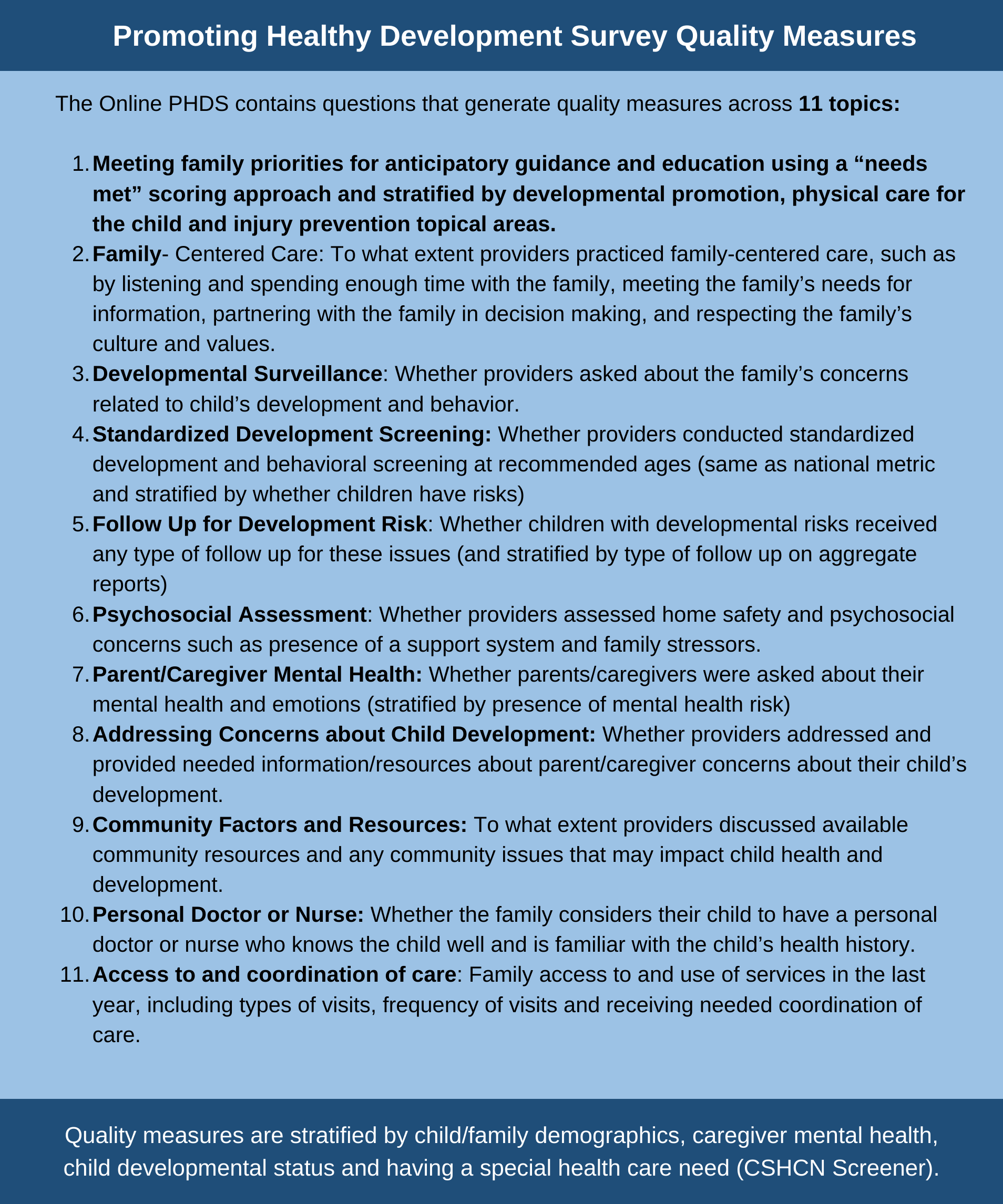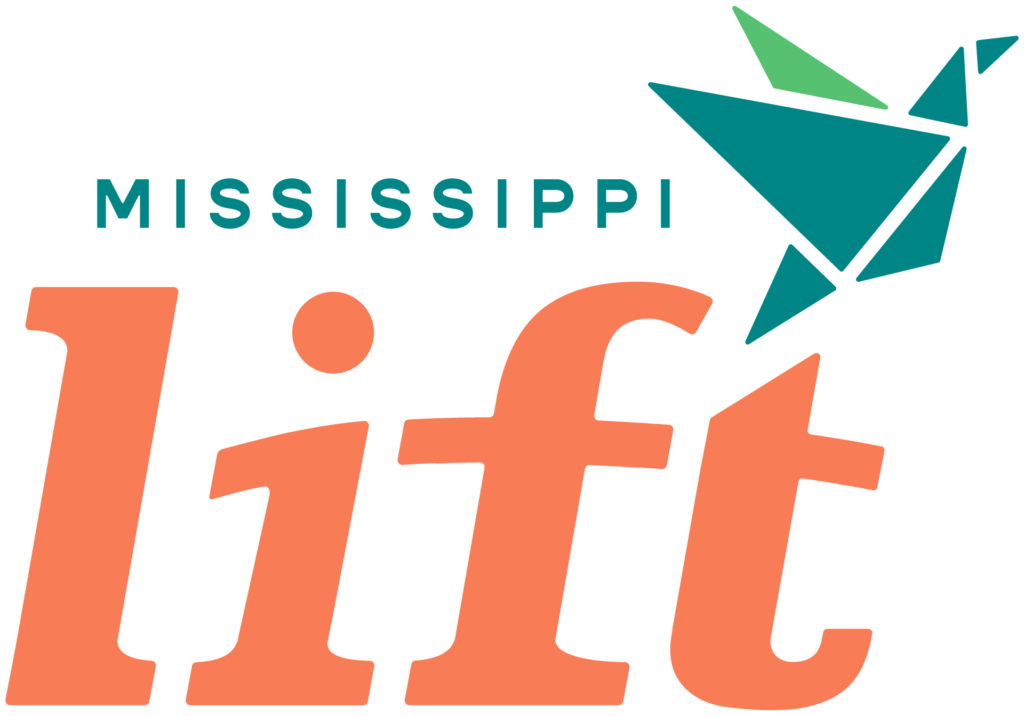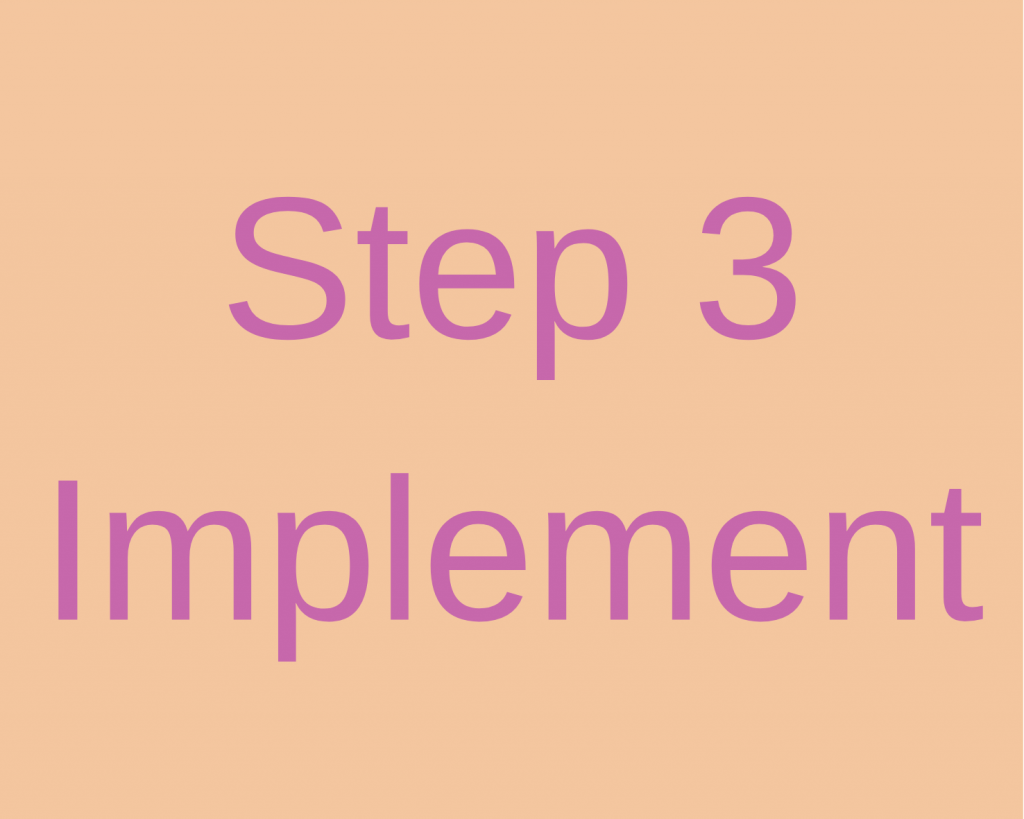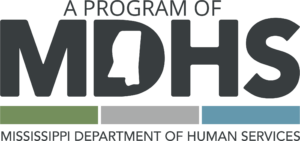Quality Assessment Using the Online Promoting Healthy Development Survey (Online PHDS)
Part 1: General Information
The Online Promoting Healthy Development Survey (Online PHDS) was designed and developed by the Child and Adolescent Health Measurement Initiative (CAHMI) as a tool to validly measure and drive family-centered improvements in the quality of care provided to young children and families across categories of quality set forth in the national Bright Futures Guidelines. The Online PHDS can be customized for your practice and families so you can invite families to link to your customized Online PHDS website and confidentially share information about their experiences and quality of care. Just like with the Well Visit Planner, both providers and families then get feedback reports on quality of care to identify needs and ways they can each partner to improve care. Providers use their Online PHDS Use Portal to generate aggregate, deidentified quality reports after at least 25 families complete the Online PHDS. This digital tool specifically assesses and reports on the quality of well-child care across areas of care recommended in the Bright Futures Guidelines for Health Supervision of Infants, Children, and Adolescents—Fourth Edition.
The Online PHDS asks parents and caregivers directly about their experiences with their child’s health care and providers, allowing them to indicate quality using a “needs met” approach, rather than an approach that assumes all children and families require the same education and supports. This means that only topics families say they wanted to discuss but about which they did not get the information they needed are flagged as opportunities for quality improvement, ensuring providers are recognized for meeting child and family needs and priorities.
Research shows families appreciate providing feedback and learn a lot by completing the PHDS and providers report using the data to track and improve care. See the visual below for what families are asked to do when they use the Online PHDS. The PHDS has been used since 1998 by health care systems and provider care teams. Parents/caregivers across the United States have completed the PHDS to learn about and partner to improve the quality of well child care provided to their young children.
See this short 4 minute video or this more comprehensive 9.5 minute video to learn more about using the Online PHDS with the children and families you serve. The visual below summarizes the process families go through when using the Online PHDS digital tool.

Part 2: What is measured using the Online PHDS?

Part 3: Implementing the Online PHDS With Families
There are 4 quick steps to register for a Cycle of Engagement account to customize and start using the Online Promoting Healthy Development Survey with the families you serve. You will receive an easy-to-use Online PHDS Use Portal for implementing the PHDS. Go to www.cycleofengagement.org to begin.
What can you do on your Online Promoting Healthy Development Survey Use Portal?
- Get quick guides to implement the COE Online PHDS using five simple steps
- Get family engagement resources
- Track completions of the Online PHDS by families
- Generate PHDS Aggregate Quality reports after at least 25 families complete the PHDS
- Update or manage your PHDS account information (e.g., password, account permissions, notification settings)
About This Resource
The overarching goal of the Child Health and Development Project (Mississippi Thrive!) has been to improve developmental health outcomes for young children through the building of a statewide developmental and behavioral health system. As part of the system build MST worked with health care providers to increase developmental screenings, connect more children to the services they need, and equip providers with materials and resources to promote developmental and behavioral health with caregivers at wellness visits. Additional work was conducted to advance more comprehensive, family-engaged, whole child approaches.
This toolkit provides information about the specific resources and approaches used to support health care providers at the University of Mississippi Medical Center to integrate developmental screening and additional approaches to engage families and conduct comprehensive screening and personalized health promotion into their pediatric practices as well as lessons learned. It was modeled after the Louisiana Developmental Screening Toolkit created by the Developmental Screening Initiative at the Louisiana Bureau of Family Health. It incorporates a Continuous Quality Improvement framework based on the clinical practice guidelines form the American Academy of Pediatrics.
This toolkit was developed by the Mississippi Thrive! Enhanced Pediatric Medical Home Services (EPMHS) team in partnership with The Child and Adolescent Health Measurement Initiative (CAHMI). The Child Health and Development Project: Mississippi Thrive! (CHDP) was a project of the University of Mississippi Medical Center’s (UMMC) Center for the Advancement of Youth (CAY) and the Social Science Research Center (SSRC) of Mississippi State University (MSU).
This project was supported by the Health Resources and Services Administration (HRSA) of the U.S. Department of Health and Human Services (HHS) as part of an award totaling $17.4 million with 0 percent financed with non-governmental sources. The contents are those of the author(s) and do not necessarily represent the official views of, nor an endorsement, by HRSA, HHS, or the U.S. Government. For more information, please visit HRSA.gov today. The Child and Adolescent Health Measurement Initiative (CAHMI) is a national non-profit initiative founded in 1996 to promote the early and lifelong health of children, youth and families using family-centered health and health care quality data and improvement tools and research. The Cycle of Engagement Well Visit Planner approach was developed and is maintained by the Child and Adolescent Health Measurement Initiative (CAHMI).














